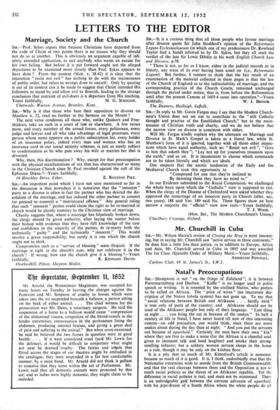Snt,—An important point which I have not seen mentioned so
far in the discussion is that nowadays it is notorious that the " innocent " party to a divorce is often in fact the partner who has desired the dis- solution of the marriage, and has induced the other partner to commit (or pretend to commit) a " matrimonial offence." Any general ruling that such " innocent " parties could claim the right to be re-married in church would be plainly contrary to the Christian view of marriage.
Charity suggests that, where a marriage has hopelessly broken down, the clergy should be given authority, after laying the matter before their bishop with evidence that they have full knowledge of the case and confidence in the sincerity of the parties, it re-marry both the technically " guilty " and the technically " innocent." This would involve a grave responsibility; but surely it is one which the church ought not to shirk. Compromises such as a " service of blessing " seem illogical. If the marriage is right in the church's eyes, why not celebrate it in the church ? If wrong, how can the church give it a blessing ?—Yours
faithfully, R. KENNARD DAVIS- On-the-Hill, Pilton, Shepton Mallet.


































 Previous page
Previous page